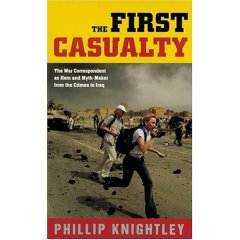
Excellent History of Biased War Reporting
Title: The First Casualty: The War Correspondent as Hero and Myth-Maker from the Crimea to Iraq
Author: Phillip Knightley
Publisher: The Johns Hopkins University Press; 3 edition (October 5, 2004)
"The First Casualty" is excellent in that it lays waste to the current myth of the need for neutrality in war reporting. The book documents the history of war reportage from the Crimean War up until the Terror War of today.
Since the Crimean War of one and a half centuries ago there has been no shortage of persons eager to go and report from wherever it is that people are being shot, bombs are being dropped, and battles are being waged. For much of this period war reporters have not been concerned about their neutrality. In fact, according to Knightley, it could be argued that there has yet to be a war covered in which correspondents were neutral.
In the Crimean War, the conflict that gave birth to the war reporter beast, William Howard Russell performed admirably, though not as an objective recorder of history. He was definitely a writer who glamorized war with his "Charge of the Light Brigade" being one of history's greatest examples of a reporter's patriotism bleeding from between the lines. Furthermore, Russell, just about the world's first war correspondent, was not afraid to criticize his government and his critical reportage was eventually partly responsible for the collapse of his nation's government. Russell was anything but neutral.
The American Civil War in many ways represents the nadir of war reporting. No one can claim that journalists followed any journalistic ethics, let alone neutrality, while covering that conflict. Journalists lied, invented stories, and recreated events due to laziness, greed, and to support personally held views. My personal favorite is the journalist that was bought off for cigars and whiskey. Knightley exposes all of this.
Though war reporting did improve throughout the end of the nineteenth century and into the first two decades of the twentieth, correspondents continued to see war as an us-versus-them struggle and they all continued to romanticize war. Churchill, Gibbons, Hemingway, and Pyle are all prime examples from the book of reporters who did this. My favorite quote from this era is by Herbert Matthews who covered the Spanish War for the New York Times. He argued,
"... I always felt the falseness and hypocrisy of those who claimed to be unbiased and the foolish, if not rank stupidity of editors and readers who demand impartiality...of correspondents writing about the war... A reader has a right to ask for all the facts; he has no right to ask that a journalist or historian agree with him."
In Korea, American journalists were accused of being too patriotic and of not being questioning enough of their country's role in the war. Knightley believes that correspondents must accept some of the blame for the two million civilians that were allegedly killed in that war.
Soon after, in Vietnam, western journalists began covering the war while supporting America's position. As the Vietnam War dragged on journalists' points of view changed as did their coverage of the conflict. For example, the My Lai massacre was uncovered and helped to accelerate America's withdrawal from Vietnam. Today it is not uncommon to hear that the press was at least in part responsible for America's defeat.
I was not as interested in the sections of the book that cover the conflicts that I actually remember. However, one interesting note from this latter part of the book is Knightley's explanation of Bob Simon's experience of being arrested in Iraq. Knightley wrote:
"The Iraqis released Simon and his crew unharmed at the end of the war."
I recently saw a televised interview with Bob Simon and I doubt that he would agree with the above over-simplified statement. According to the interview that I saw Simon was badly beaten while he was in custody. And beaten for weeks or months (I cannot recall exactly) What really makes the above quotation remarkable is the paragraph that precedes the Simon paragraph. The last sentence of that paragraph says the following about a Time photographer being, "...blindfolded, searched, and held for more than 30 hours by a National Guard unit." Perhaps I am seeing something that is not there, but to me the two paragraphs, one right after the other, give a moral equivalency to the two events that should not exist.
The book at around 600 pages is close to becoming not a book to read but a book to refer to. That is fine in my opinion and I sincerely hope that Knightley continues to update it as wars continue to pop up around the globe.
Good reading,
Andrew Greene
Jakarta, Indonesia


3 comments:
very interesting, definitely one to check. you can check my anobii page for my book list too, loads of stuff about war - too many according to some. but that's only because i only recently add them.
Hello Treespotter,
I will check out your book list. Thanks.
actually, one interesting one is by Jon Reese called War Junkie, a war correspondent for ITV. very good read.
Post a Comment